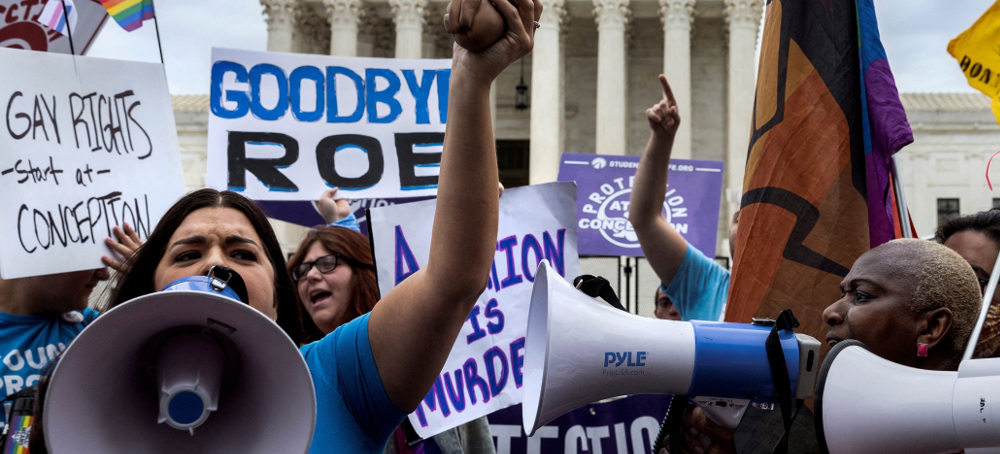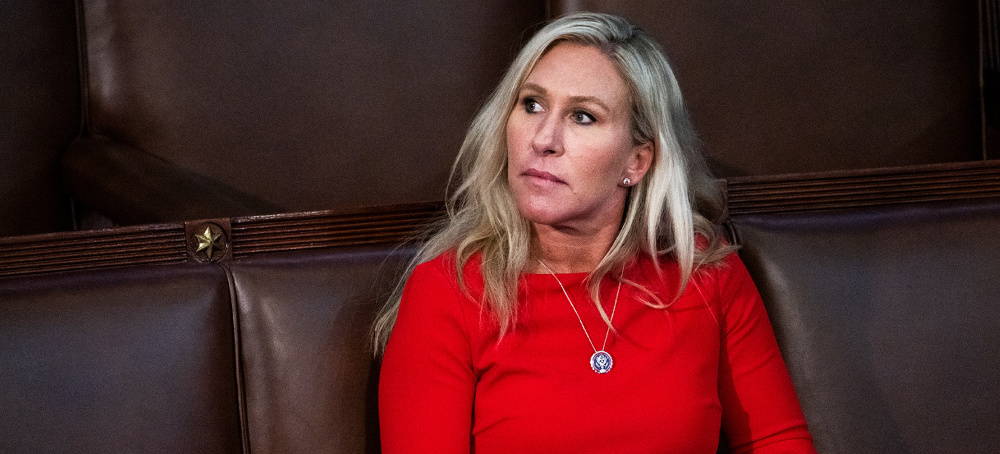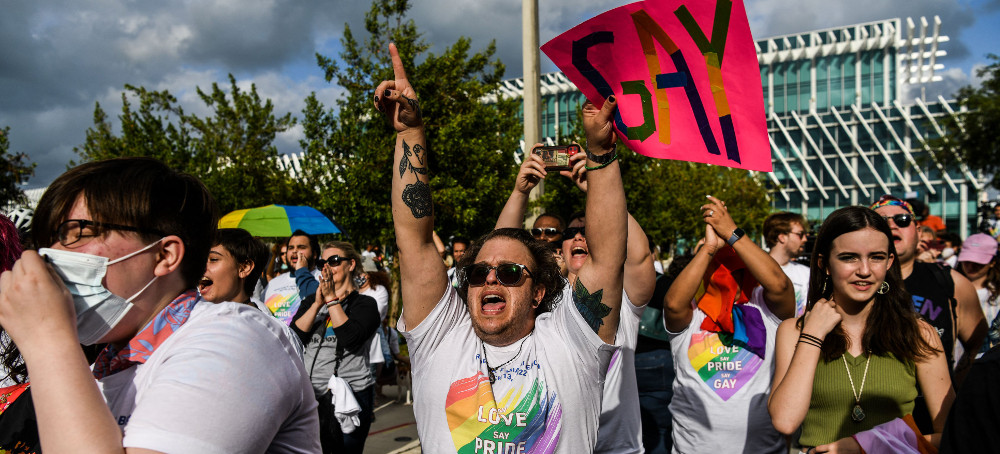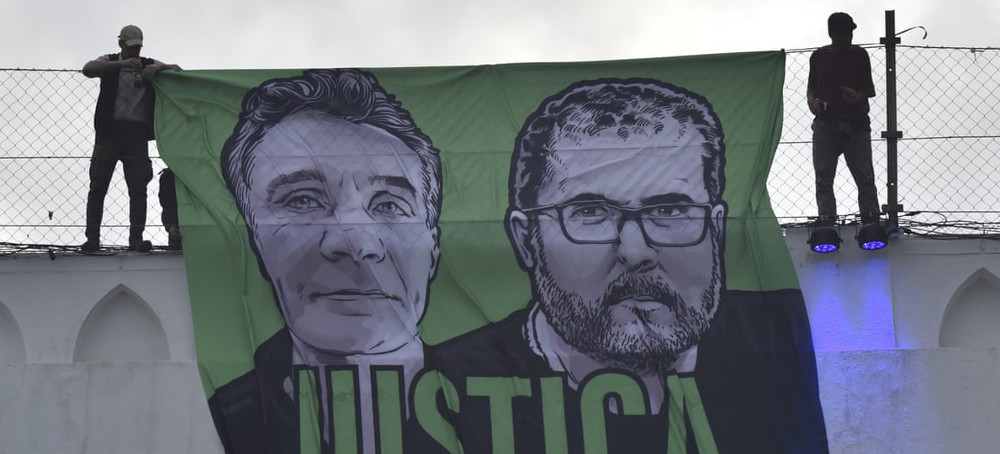Live on the homepage now!
Reader Supported News
The article below is satire. Andy Borowitz is an American comedian and New York Times-bestselling author who satirizes the news for his column, "The Borowitz Report."
An incandescently angry Trump addressed the media at his Palm Beach home and accused his former running mate of being “the lowest form of life” for taking documents “that were rightfully mine.”
“Mike Pence took documents from the White House without asking me first if I wanted to take them,” he said. “Mike Pence kept me from having a complete collection of documents, and that, quite frankly, is a disgrace.”
Calling Pence “a total snake in the grass,” Trump said, “All the time he was sucking up to me, he was busy shoving documents down his pants. Some Christian!”
He added that “the Constitution needs to be rewritten” to keep future Vice-Presidents from taking documents that the President might want. “This should never be allowed to happen in our country,” he said.
READ MORE  Trump's legal team has delayed actually arguing the facts. But now his family company is under threat of being dissolved, and he could have to pay up big. (photo: Spencer Platt/Getty)
Trump's legal team has delayed actually arguing the facts. But now his family company is under threat of being dissolved, and he could have to pay up big. (photo: Spencer Platt/Getty)
Trump's legal team has delayed actually arguing the facts. But now his family company is under threat of being dissolved, and he could have to pay up big.
His riches are being threatened by a powerful law enforcement tool that AG Letitia James is wielding like a sledgehammer. Her civil lawsuit against him and his family—which accuses them of rampant bank and tax fraud—relies on the state’s Executive Law 63 (12). Its potential to deal serious damage is evident by how desperately the former president has tried to avoid fighting it head-on.
Rather than present an actual defense, Trump has questioned for nearly a year whether that law even gives AG Letitia James the authority to target his family company. He’s failed miserably.
This month, he was shut down by a New York judge who threatened to sanction his lawyers over this issue. After being fined $1 million by a federal judge tired of his “frivolous” antics, Trump is now in full retreat. He withdrew a Florida lawsuit against James last week, and he dropped a similar one against her in New York on Tuesday.
Trump must now confront a legal weapon that could blow up his finances and end his family company, several former attorneys general and prosecutors told The Daily Beast.
“It’s the cornerstone statutory authority for an attorney general to launch investigations and initiate prosecutions. The language is broad. It talks about persistent fraud and illegality. She has the authority to protect the public from scammers,” said Bob Abrams, who served as New York attorney general from 1979 until 1993.
The law, as written, empowers the state’s top prosecutor to stop any business from engaging in “repeated fraudulent or illegal acts,” seeking potentially lucrative damages, and canceling its official business certificate.
James’ lawsuit, filed in September, seeks $250 million-plus and wants to revoke the Trump Organization’s business credentials—as well as bar it from borrowing from banks in what’s become the finance capital of the world.
Abrams said this latest effort by James is the natural culmination of a half-century that saw the role of the attorney general transformed from the defender of a state government to a Robin Hood looking out for the little guy. In fact, the state law she’s now using against Trump was central to that change. The law enforcement provision was the result of lobbying by one of her predecessors, Jacob K. Javits, who spent two years as the state’s AG before moving on to the U.S. Senate.
In 1956, The New York Times described how Javits celebrated what he called “powerful new weapons in his fight to prevent frauds against the public.” A decade later, then-AG Louis K. Lefkowitz wrote to the state’s constitutional convention about the importance of this law enforcement tool in guaranteeing the independence and effectiveness of that office. And a decade after that, historical documents show that legislators sharpened the tool by allowing prosecutors to seek damages.
New York’s top cop used it to strengthen cases against companies that duped people—like fly-by-night outfits that kept what investigators called “sucker lists” of people who could be tricked into a scam—sparking a wave of similar laws and cases across the country, according to several lawyers who worked in that office.
“We were pretty aggressive in how we used the power of the attorney general’s office to try and advance environmental rights, which became a very important objective in the AG’s office—as well as civil rights. And we also did a lot of consumer protection. There were so many abuses of consumer rights and scams. We prosecuted dozens of scams,” said G. Oliver Koppell, who served as New York’s AG in 1994.
But legal scholars noted that the current attorney general’s case is still breaking new ground; James is using the law in a way it hasn’t exactly been employed before.
In her case against the Trumps, the real estate family is accused of inflating the price of the properties they own to snag better bank loans under false pretenses—or in another instance, jacking up the estimated value of a forested estate donated to conservation in order to balloon a tax write-off. In court, her staff attorneys have laid out how banks and insurance companies were defrauded while taxpayers were left on the hook.
It only makes sense for James to employ the sledgehammer of Executive Law 63 (12) if “consumer protection” also means cracking down on fraud generally to ensure a fair marketplace, former prosecutors told The Daily Beast.
“It’s something of a stretch. I think the law was primarily intended to go after consumer fraud. When I was there, we certainly focused primarily on consumer fraud…. people who got [swindled] in the mail or were induced to buy things they didn’t need. We really didn’t look at it as a business fraud law,” Koppell said.
But the ex-AG said that James’ decision to employ a novel use of the law still abides by the spirit of the law, which is to crack down on criminality wherever it exists.
“I’m not opposed to it,” Koppell added.
In court last November, the team of attorneys representing Trump’s business interests in this case questioned why taxpayers should fund an expensive legal fight over alleged bank fraud when those same lenders—among them, Deutsche Bank—haven’t even complained. The argument was shrugged off by Justice Arthur F. Engoron, who is overseeing the case and who seemed receptive to the AG’s arguments that the office has a responsibility to clamp down on fraud. The judge himself pointed out the unbelievable extent of Trump’s lies, which included blatantly lying about the size of his Trump Tower penthouse and tripling its square footage.
In a subsequent order, Engoron pointed out just how powerful of a tool James is wielding. She can use it to snatch every penny Trump has made based on false representations, which includes the $10 million he made selling the Trump International Hotel Washington in the nation’s capital. And a source familiar with the investigation said the AG could also seize $200 million—the value of the nonexistent penthouse space Trump benefited from lying about.
In an order that seemed to poke at Trump’s tendency to stretch the bounds of reality, Engoron wrote that “Executive Law § 63 (12) broadly empowers the Attorney General of the State of New York to seek to remedy the deleterious effects, in both the public’s perception and in reality, on truth and fairness in commercial marketplaces and the business community.”
That case is steadily proceeding to trial, which is currently scheduled for October this year—just as Trump is set to ramp up his campaign to retake the White House.
Trump’s attempts to question the AG’s ability to use this law are particularly comical to lawyers who’ve been watching this latest case unfold—it’s already been used twice to shut down Trump enterprises.
The New York AG’s Office used it to takedown Trump University, a for-profit education scam that sold hopeful entrepreneurs on the promise of inside advice from Trump but instead had them take selfies next to his lifesize cardboard cutout. It used that same law to force Trump to shut down his charity, the Trump Foundation, after he used it to break campaign finance laws by funneling $25,000 to Florida’s top prosecutor at the time, Pam Bondi.
Those previous Trump failures are why the current fight seems like a solid win for the AG, said a lawyer familiar with the case who spoke on condition of anonymity.
“If the facts are against you, argue the law. If the law is against you, argue the facts. If the law and the facts are against you, pound the table,” they said, quoting the American poet Carl Sandburg.
“It is indeed a sweeping and powerful tool for the AG,” said Daniel L. Feldman, a professor at the City University of New York’s John Jay College of Criminal Justice. He wrote a chapter about that office and its use of the law in The Oxford Handbook of New York State Government and Politics.
Feldman surmised that the best defense Trump’s lawyers could put together at this point would be to argue that lying about real estate values is the norm.
“The only argument against the AG’s power to do this is that this kind of practice is so endemic to the real estate industry, so commonplace, that it’s actually an accepted practice… it’s a custom and tradition of that industry, therefore, it’s not really fraud,” Feldman said.
But those bigly lies won’t work either, he cautioned.
“Now, I don’t buy that for a few reasons. The fact that everybody does it doesn’t make it legal. Trump did it to an extent I’ve never heard of anyone doing it. The egregious exaggerations went way beyond other people,” he said.
 Mainstream anti-abortion activists have long insisted they don't want to punish people who get abortions. Now, that claim is being put to the test. (photo: Getty)
Mainstream anti-abortion activists have long insisted they don't want to punish people who get abortions. Now, that claim is being put to the test. (photo: Getty)
Mainstream anti-abortion activists have long insisted they don’t want to punish people who get abortions. Now, that claim is being put to the test
Although many states are only a few weeks into their first state legislative sessions since Roe v. Wade was overturned, legislators in Arkansas and Oklahoma have already introduced bills that would punish abortion patients. In Alabama, the state’s attorney general initially said he could use a state law to punish people for ending their pregnancies, then tried to walk it back.
These kinds of tactics are forcing anti-abortion activists to confront a long-simmering tension within their movement: What are they supposed to do with people who get abortions? Typically, abortion restrictions target providers, not patients. Within the anti-abortion movement, patients are treated like victims who have been bamboozled into ending their pregnancies by the predatory “abortion industry.” But now that Roe is gone and states are proposing policies to legally treat fetuses like people, that may not hold water for much longer.
“I think there are some people, and probably a fairly large group of people, for whom women’s innocence is conditional and they could be persuaded that it’s not real,” said Mary Ziegler, a professor at the University of California, Davis, law school who studies the legal history of reproduction.
Speakers at the March for Life and National Pro-Life Summit in Washington, D.C. last weekend repeatedly suggested that only a lack of knowledge keeps abortion patients from seeing the “truth” about abortion, and that they can be converted to the anti-abortion cause. This is part of the thinking behind “sidewalk counseling,” the practice of standing outside abortion clinics to convince patients not to go inside, and behind crisis pregnancy centers, facilities that try to persuade people to continue their pregnancies.
“We as pro-lifers have things in the right order, right?” Lauren Muzyka, of Sidewalk Advocates for Life, told National Pro-Life Summit attendees. “God comes first, a mother puts a child before herself. So you might say the right order, the natural law order, is God, baby, mom. But a woman in crisis mode, a woman in self-preservation mode, has all of that inverted.” Muzyka suggested that attendees find out how far into a pregnancy a patient is, then give them information about a fetus’ development. “We need to do everything in our power to meet her where she’s at and love her into a decision for life.”
But “fetal personhood,” the idea that fetuses deserve the full rights and protections granted to humans who have been born—and sometimes, that a fetus’ rights trump those of the person carrying them—also lies at the heart of the anti-abortion movement’s argument that abortion is wrong. Assuming the perspective of an anti-abortion activist, Ziegler asked, “If we’re serious about personhood, how can we not punish women?”
The Arkansas bill proposes that “all unborn children should be protected under the state homicide laws,” which could lead abortion patients to be prosecuted as murderers. The Oklahoma bill, introduced by Republican state Sen. Warren Hamilton, would amend the state’s current near-total abortion ban to remove language that currently blocks prosecutors from charging “a woman with any criminal offense in the death of her own unborn child.”
This move isn’t totally unexpected from Hamilton, who in 2020 announced he would introduce a bill called, in part, the “Abolition of Abortion in Oklahoma Act,” which also banned abortion. He changed the name when he filed it in 2021, but the word “abolition” carries a unique weight within the anti-abortion world: A wing of activists who now identify as “abortion abolitionists” believe that abortion should be legally categorized as murder and that, because a fetus is a person, individuals who get abortions should be punished like murderers. (The anti-abortion movement, in general, is largely white.)
Ahead of his 2020 election, one of the major “abolitionist” groups, Free the States, endorsed Hamilton. Hamilton’s office did not immediately respond to a request for comment on his new bill.
Bills with “abolitionist” underpinnings have popped up intermittently in recent years. In 2021, a Texas legislator introduced a bill that would threaten abortion patients with the death penalty; similar legislation was also introduced in 2017 and 2019. Those bills, which proved to be PR disasters for anti-abortion activists, never advanced very far in the Texas legislature. Republicans and leaders of national anti-abortion organizations have condemned them; Catherine Glenn Foster, head of the influential organization Americans United for Life, told Vox of the 2019 Texas bill, “It’s something that I would fight back against and everyone I know in the movement would fight back against.” Hundreds of people testified at a committee hearing on the bill.
Punishing people for abortions is an incredibly unpopular position. Just 14 percent of U.S. adults say women should serve jail time if they have an illegal abortion, according to Pew Research Center. Even Republicans dislike the idea; just 21 percent think that women should be jailed. Sixteen percent of adults, though, say she should pay a fine or perform community service, while another 17 percent aren’t sure what should happen.
Men are also more likely than women to say that a woman should face a penalty for an illegal abortion.
Although abortion bans tend to punish medical providers, that idea is divisive, too: Only a quarter of U.S. adults support sending doctors and other providers to jail for performing illegal abortions, according to Pew.
However, abortion rights are also very popular. Three in five Americans believe abortion should be legal in all or most cases. Yet, thanks to years of dedicated and disciplined organizing, the anti-abortion movement successfully overturned Roe.
It’s not that there are now more abortion “abolitionists,” according to Ziegler, but those who exist are becoming better organized. They may also be set to take advantage of what Ziegler calls “the enforcement problem.” Although abortion bans are now in effect in at least 13 states, those bans are proving difficult to enforce, thanks to the availability of abortion-inducing pills online and people’s ability to travel across state lines for abortions.
Under current law, if a doctor performs an abortion on a person from a state with an abortion ban, that doctor isn’t at risk of prosecution. (One congressman from Indiana did recently say he would support legislation to stop someone from traveling out of state for an abortion in the first place.) Frustration with that loophole may lead some activists to push to punish someone, anyone, for getting an abortion—and the patient is usually the most visible target.
“Some people are saying, ‘What else are we really supposed to do?’” Ziegler said. “If the doctor or the abortion fund or whatever is in a different state or a different country and we want to stop this abortion and we don’t have a national tool, the only option left is punishing the pregnant person.”
READ MORE  Rep. Marjorie Taylor Greene (R-GA) is seen on the House floor. (photo: Tom Williams/Getty)
Rep. Marjorie Taylor Greene (R-GA) is seen on the House floor. (photo: Tom Williams/Getty)
The Georgia congresswoman once compared masks to the Holocaust. She's now sitting on a House subcommittee to probe the pandemic
The committee is a clear signal of the House GOP’s strategy to investigate Democratic policies.r. Greene’s inclusion is a marker of the tone the investigation is likely to take, as the Georgia congresswoman was a prominent megaphone for Covid-19 misinformation and conspiracy theories, which harshly criticizing mitigation measures.
Most notably, in May 2021 Greene compared mask requirements on the House floor to “the type of abuse” suffered by Jews during the Holocaust. She accrued at least $48,000 in fines for ignoring House Covid restrictions. The congresswoman also promoted conspiracy theories that the virus was a Chinese manufactured bio-weapon, and has called for former National Institute of Allergy and Infectious Diseases (NIAID) Director Anthony Fauci to be imprisoned. Greene’s repeated use of social media to spread pandemic misinformation even resulted in multiple suspensions of her Twitter accounts, including a permanent ban on her personal profile. The ban was reversed in November by Twitter owner Elon Musk.
The subcommittee will be led by Ohio Representative Brad Wenstrup, who was among the Republican members of the House Intelligence Committee) to conduct an inconclusive, but suggestive, investigation into the origins of the virus. Other members include Representatives Nicole Malliotakis (R-N.Y.), Debbie Lesko (R-Ariz.), Ronny Jackson (R-Texas), Mariannette Miller Meeks (R-Iowa), Michael Cloud (R-Texas), John Joyce (R-Pa.), and Rich McCormick (R-Ga.).
Several of the appointed members opposed public health measures, and some promoted conspiracy theories regarding the pandemic. Rep. Jackson accused Democrats of inventing the Covid Omicron variant as a way to “cheat” in the 2022 midterms.
While the House will be largely restrained in its ability to legislate under a Democratic Senate and White House, the GOP is set to weaponize its subpoena and committee powers to put on a counter-narrative spectacle for the American public. With an appointment to the Homeland Security Committee and several deals with McCarthy already in her pocket, Greene is set to be one of the Republicans running the show.
READ MORE  Members and supporters of the LGBTQ community attend the "Say Gay Anyway" rally in Miami Beach, Florida, March 13, 2022. (photo: Chandan Khanna/Getty)
Members and supporters of the LGBTQ community attend the "Say Gay Anyway" rally in Miami Beach, Florida, March 13, 2022. (photo: Chandan Khanna/Getty)
In a report issued Tuesday by the Williams Institute, a public policy research institute based at the UCLA of Law, and Clark University in Massachusetts, 56 percent of LGBTQ parents surveyed said they were considering leaving Florida over concerns about how the new law may impact their children and family. Another 17 percent said they had already taken steps to do so.
“I am terrified that I would need to make the decision to leave Florida and leave my parents,” one respondent said. “The idea of having to leave to protect my child and my partner is scary but one I am willing to do.”
The new law, officially titled the “Parental Rights in Education” law, bars public kindergarten through third grade teachers from engaging in classroom instruction related to sexual orientation and gender identity – subjects the measure’s proponents in the state legislature last year argued are inappropriate for young students.
Educators through high school are barred from addressing either topic in the classroom in a manner that is not “age-appropriate or developmentally appropriate” for their students. Florida public school teachers who violate the law risk having their licenses suspended or revoked under a rule adopted by the state Board of Education in October.
LGBTQ parents in Florida surveyed by the Willams Institute between June and September said their initial response to the bill, introduced last January in the state House, ranged from fear to disbelief. Many were unconcerned about the measure at first because they believed it would not be signed into law or was unenforceable.
Over time, however, as the measure moved swiftly through the legislature, LGBTQ parents who were initially not worried became increasingly concerned. Some even considered removing their children from the public school system altogether, according to the Williams Institute survey.
LGBTQ parents surveyed by the group voiced a variety of concerns about the “Don’t Say Gay” law’s expected impact on their children, including that it would restrict them from speaking freely about their families, negatively impact their sense of legitimacy and encourage a hostile school climate.
“Many are concerned that the bill will not only result in restricted or nonexistent education about the existence of diverse sexual and gender identities, but it will result in a chilly or hostile school climate for LGBTQ educators, students, and families because it suggests that something is wrong with LGBTQ identities,” researcher Abbie E. Goldberg, a psychology professor at Clark University, wrote in the report.
LGBTQ parents with LGBTQ children said they were especially worried how the law would impact their child’s learning environment and mental well-being, and 13 percent said their children have expressed fears about continuing to live in Florida as an LGBTQ young person.
Florida Gov. Ron DeSantis (R), seen as a top GOP contender for the 2024 presidential election, has spearheaded a statewide crusade against LGBTQ issues and identities over the last year, calling for physicians who provide gender-affirming medical care to transgender minors to be sued and accusing teachers and public school systems of indoctrinating vulnerable young people with “woke gender ideology.”
Earlier this month, as he was sworn in for his second term as governor, DeSantis touted his administration’s success in passing educational reforms including the “Parental Rights in Education” law and pledged to ensure Florida schools “are focused on academic excellence and the pursuit of truth, not the imposition of trendy ideology.”
“Florida must always be a great place to raise a family – we will enact more family-friendly policies to make it easier to raise children and we will defend our children against those who seek to rob them of their innocence,” DeSantis said.
But according to LGBTQ parents, Florida has become an increasingly hostile place to live.
Nearly a quarter of LGBTQ parents surveyed in the Williams Institute report said they feared being harassed by their neighbors because of their sexual orientation or gender identity or expression, and more than 20 percent said they had been out less in their neighborhood, workplace or community over the past 3 to 6 months.
“The Don’t Say Gay bill claims to be for parent rights, but my rights have been taken away since its passage,” one respondent said. “My right to send my daughter to school freely, my right to live without fear of who I am, my right to not be discriminated against based on my sexual orientation, and my daughter to not be discriminated against based on her parents’ sexual orientation.”
For some LGBTQ parents, the passage of Florida’s “Don’t Say Gay” law has motivated them to engage more directly in community activism; nearly 20 percent said they participated in a demonstration to protest the legislation over the past 6 months.
Others spoke to how their parenting and activism serves as means of queer resistance and empowerment.
“We do our best to instill the right things in our children to help them grow to be kind collectivemembers of society,” one survey respondent said. “As queer parents we do this all in spite of a society that actively tries to silence us. But what they do not understand is that we also raise our children to scream above the silence and fight for the right to love and exist without persecution.”
READ MORE  Committee to Protect Journalist reports Latin American region accounted for almost half of the 67 journalist deaths worldwide. (photo: Getty)
Committee to Protect Journalist reports Latin American region accounted for almost half of the 67 journalist deaths worldwide. (photo: Getty)
Committee to Protect Journalist reports region accounted for almost half of the 67 deaths worldwide
In a report released on Tuesday, the group said that, globally, at least 67 journalists and media workers had been killed in 2022, nearly double the 2021 figure of 45.
Almost half of last year’s killings took place in Latin America and the Caribbean, where at least 30 journalists were killed, including the longtime Guardian contributor Dom Phillips.
Phillips was murdered last June while documenting Indigenous efforts to protect the Brazilian portion of the Amazon rainforest for a book he was writing. His alleged killers have yet to be brought to trial, although on Monday police named the alleged mastermind behind the crime.
“It’s an incredible number of people … the highest we have ever recorded in the region,” said the CPJ’s New York-based programme director, Carlos Martínez de la Serna. “And I don’t have any reason to think that this year is going be different unless we see very radically different approaches [from governments], like creating effective protection mechanisms [for journalists].”
The CPJ report said the rising number of killings in Latin America and the Caribbean reflected “the outsize risk journalists in the region face while covering topics such as crime, corruption, gang violence, and the environment”.
“Covering these beats is becoming extremely dangerous,” said Martínez de la Serna, who blamed the chronic lack of justice for the deteriorating situation.
“The cost of attacking or killing a journalist is extremely low. Most of the cases are never solved. There is never justice – and those responsible … are not held [to account],” he added.
The CPJ said at least 15 journalists had been killed in Ukraine after Russia’s invasion in February 2022. Almost as many journalists were killed in Mexico, a country officially at peace, where the advocacy group documented a record 13 killings. Those murdered included the celebrated crime photographer Margarito Martínez Esquivel, who was gunned down outside his Tijuana home in January 2022.
Seven journalists were killed in Haiti, which has spiralled further into political and humanitarian crisis since the assassination of its president, Jovenel Moïse, in July 2021, and now does not have a single democratically elected government official.
Martínez de la Serna said: “We are comparing the numbers of Mexico and Haiti with Ukraine, which is at war – so that gives us a sense of the situation regarding the law, the humanitarian crisis in Haiti, the dimension of the political and social unrest … the lack of justice and the lack of protective measures.”
The CPJ also documented work-related killings of journalists in Chile and Colombia and was investigating other deaths in Ecuador, Guatemala, Honduras and Paraguay.
In Peru, more than 70 journalists have been harassed or attacked since the outbreak of deadly political unrest there last month, including a photographer for the Spanish news agency EFE who police shot in the leg with pellets after threatening to “blow off” his head.
Recent weeks have seen some glimmers of hope for journalists covering an increasingly perilous region.
Brazil’s new government has promised to create a special observatory to monitor attacks on the press after the far-right uprising in Brasília on 8 January. The Brazilian Association of Investigative Journalism said at least 40 journalists were attacked, robbed or harassed while covering that rebellion, including one veteran journalist who was briefly taken captive by supporters of the former far-right president Jair Bolsonaro, beaten and threatened with a gun.
“I started begging for my life … I was in panic,” he told the newspaper O Tempo. “They told me I was never going to get out of there.”
Martínez de la Serna said he was encouraged by journalists mobilizing to protect themselves in Central America and Venezuela, and by signs that Luiz Inácio Lula da Silva’s new administration in Brazil wanted “constructive and respectful” relations with the press after four grim years under the media-bashing populist Bolsonaro.
“It’s encouraging to see authorities moving in that direction, as Lula has promised to do,” he said, adding that it was “very important that politicians understand that we need to see action” to protect journalists.
READ MORE  A police cruiser burns as demonstrators protest the death of environmental activist Tortuguita on January 21, in Atlanta. (photo: Elijah Nouvelage/Getty)
A police cruiser burns as demonstrators protest the death of environmental activist Tortuguita on January 21, in Atlanta. (photo: Elijah Nouvelage/Getty)
Environmental defenders get killed at appalling rates in other countries. Could that trend come to the U.S.?
The snowballing militarization of police in the United States has coincided with a heightened criminalization of protests. Both efforts share the generous backing of corporate funders. If both phenomena continue to proceed apace, it’s easy to imagine more protesters may soon, like Terán, be hurt or killed.
Police killings of environmental defenders are much more common in other countries with major extractive industries, including Brazil, Honduras, and Nigeria: Research released last year from Global Witness found that an environmental defender was killed every two days over the last decade. While Terán’s shooting is the first known police killing of a forest defender in the U.S., a drumbeat of recent bills have increasingly depicted those protesting major development projects as public enemy number one. If the post-9/11 security state has a mantra, it’s that it’s easier to get away with killing someone if you can call them a terrorist. And the South Woods Forest case seems, tragically, to illustrate that principle: Seven of the forest defenders swept up in last week’s raid have now been charged with domestic terrorism, on top of the six Stop Cop City activists charged with domestic terrorism and a host of other felony and misdemeanor charges last month.
In the years since demonstrations against fossil fuel infrastructure like the Keystone XL and Dakota Access pipelines gained notoriety, 39 states have passed bills to further criminalize protests near oil and gas pipelines and other “critical infrastructure.” Part of this wave was Georgia’s Senate Bill 1. Passed in 2017, the measure lowers the threshold for slapping protesters with domestic terrorism charges, including actions by any one individual against critical infrastructure defined as “public or private systems, functions or assets, whether physical or virtual, vital to the security, governance, public health and safety, economy, or morale of this state or the United States.” Actions intended to further “any ideology or belief” are also vulnerable to such charges. Like other such bills, S.B. 1 resembles model policy promoted by the American Legislative Exchange Council, or ALEC, the technically nonpartisan group that has blanketed state legislatures with carbon copies of right-wing priorities like right-to-work and Stand Your Ground laws. As Alleen Brown reported for The Intercept, drawing on research from Greenpeace, fossil fuel companies have been instrumental in pushing for those bills both as ALEC members and through state-level lobbying efforts.
The 85-acre project the activists in the South Woods Forest were trying to prevent is backed by the Atlanta Police Foundation, one of a number of nonprofit organizations dedicated to funneling corporate money toward police departments. It’s pledged $60 million toward the facility, slated to feature a “mock city for real world training” featuring a fake night club and convenience store—all on land leased to the APF for $10 a year by the City of Atlanta. Residents would be tasked with paying the remaining $30 million it’s projected to cost. As Timothy Pratt reported for Atlanta magazine, public input into the APF’s plans has been sparse. While a majority of comments filed about the facility oppose it, City Council voted 10–4 to move ahead.
While there are now police foundations in nearly every major city, Atlanta’s stands out. Atlanta is the thirty-eighth-largest city in the country. Its police foundation is the second largest after New York. According to a 2021 report from Color of Change and the watchdog group LittleSis, the Atlanta Police Foundation’s revenue increased by 45 percent between 2018 and 2019. Policing accounted for a third of the city’s $700 million budget in 2022; in 2019, the Atlanta Police Foundation gave the department $11 million. It has purchased 11,000 surveillance cameras, as well as SWAT team equipment. Less than a week after police shot and killed Rayshard Brooks in the summer of 2020—when the chief of police resigned and two of the officers involved were indicted on felony charges—the Atlanta Police Foundation gave every officer in the city a $500 bonus.
Police foundation funders nationwide, Color of Change and LittleSis report, include the country’s largest companies and firms that have at one point been private-sector members of ALEC. Among those backers too are the fossil fuel companies that have pushed through protest-criminalization bills, including Marathon Petroleum. The Atlanta-based logistics giant UPS has people in leadership positions in both ALEC and the APF. The APF board of directors, for instance, includes UPS Chief Legal and Compliance Officer Norman Brothers Jr., as well as former UPS Senior Vice President of U.S. Operations Calvin Darden. UPS President of Government Affairs Mike Kiely serves on ALEC’s Private Enterprise Advisory Council.
The same interests looking to criminalize protests against fossil fuel infrastructure are also looking to build out an ever more muscular police force capable of enforcing those laws—including against developments like Cop City. The broader logic here isn’t hard to interpret: If protecting corporate profits and priorities is the goal, nothing should be able to get in the way—no matter the cost in human life.
Follow us on facebook and twitter!
PO Box 2043 / Citrus Heights, CA 95611


No comments:
Post a Comment
Note: Only a member of this blog may post a comment.